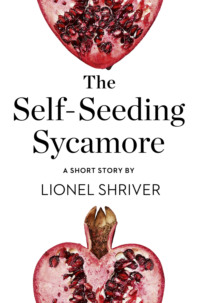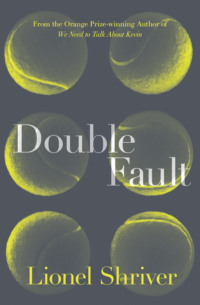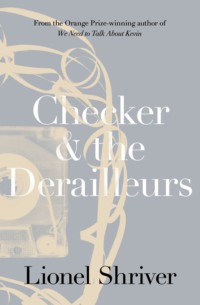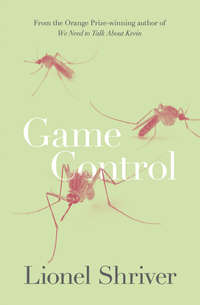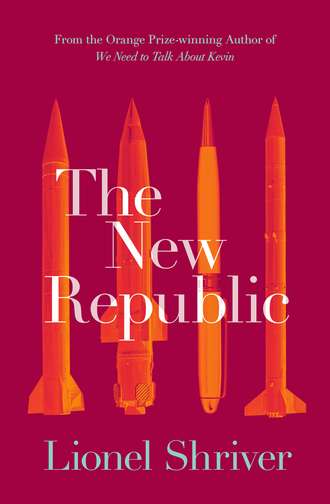
Полная версия
The New Republic
Disquieted, Edgar disentangled himself. He disapproved of sloth, and had a positive horror of honeyed pastries. The bedding was contaminated with another man’s fantasy life.
Edgar padded gingerly around the room, as if afraid to wake someone up—like himself. More crimson velvet canopied the bed, and velvet drapes hung on rings from the frame’s upper rail. The curtains could be pulled all the way around the mattress to make a private tent. The fragrant dark cherries and rosewoods of the massive furniture were carved into busty prows of women or tumbles of ripe fruit; the bureau shimmered with mother-of-pearl inlays. A mosaic of colored glass beads framing the mirror threw highlights on Edgar’s naked figure, making his chest look more finely muscled than it was and his complexion lustier than he felt. The reflection likewise elongated his frame to tower beside the bedpost, and Edgar was only five-foot-eight. It was a mirror made for self-deceit. What it must have done for Saddler, a much larger man by all accounts, well—he must have looked leviathan.
Penetrating scents of cedar, sandalwood, and the residual haunt of a woman’s perfume intoxicated Edgar with the giddy notion of going back to bed. Rubbing his eyes, he ambled to the cavernous en suite bath to splash his face in the black alabaster sink. Drying, he plunged into a white towel plush as rabbit’s fur; the nap buried his fingers to the first knuckle. Scoping out the sunken tub—round, black marble, and wide enough for laps—he drew himself a bath.
Edgar treated himself to warm-up hot-water blasts and picked through an array of toiletries—saffron conditioner, mandarin-and-cloudberry shampoo, almond oil, truffle-and-musk mud-mask: effeminate frippery. Edgar inclined toward plain Ivory and timeless Head & Shoulders: man-stuff. Still. He tried the cloudberry shampoo.
The clothing he’d packed was clearly too summery, so Edgar was able to rationalize picking through rack upon rack of preposterous regalia in the walk-in closet: old-fashioned tails and cutaways, with magenta cummerbunds; kimonos whose dragons licked up the facing; quilted smoking jackets; flowing rayon shirts wide as kites, writhing with van Gogh sunflowers or flaming with foot-wide poinsettias; a charcoal woolen cape, lined with cream silk, fit for Bela Lugosi; some biblically voluminous caftans and togas; and a number of officers’ uniforms from foreign military outfits, whose appearance of authenticity was all the more reason not to prance around in them. None of the outlandish glad rags suited a man for writing, only for being written about. Although a smattering of standard Anglo fare—Burberrys, camelhairs, and tweeds from the finest London tailors—bespoke a journalist who occasionally did his job, the suspenders (braces, a voice whispered) marched with toy soldiers, and there wasn’t a tie to be found, just two dozen ascots.
Impetuously, Edgar slipped a dressing gown off its wooden hanger. The radiant golden robe faced with plum brocade might have costumed Apollo Creed.
Camp, sure. But somehow in their vastness all these garments stopped shy of kitsch. The lines of the finery were so drastic, their patterns so fantastic, their pretensions drafted on such a scale that they were rescued from ridiculousness by sheer audacity.
Except on Edgar. A foot too long, the nacreous dressing gown dragged like a wedding train. The shoulder pads drooped to his elbows, and the sleeves dangled inches beyond his fingertips. Even in the magic mirror, he looked like a Norman Rockwell: Junior Wears Father’s Bathrobe.
Fuck it. Edgar gathered the train and swirled out of the bedroom with a little transvestite flounce, assured that you could get away with anything so long as you did it with conviction.
Nicola was right: the house was enormous. Edgar’s disgust that the National Record would coddle any correspondent with such palatial accommodations failed to undermine exultation at his own good fortune. Aside from the one tiny round tower, the villa rose only two stories high, but spread across what must have amounted to half a New York City block. Its Moorish architecture expressed the clean, wide lines of Frank Lloyd Wright fare, without the iciness of modernity. Hanging tapestries and Oriental carpet softened the perpendiculars of mosaic tile and marble parquet. Downstairs was constructed on a variety of levels, the floors landscaped into benches cushioned with rotund pillows. The dining area’s table, like the bath, was sunken.
Though the western windows looked frosted, their panes were pitted irregularly: dulled by gale-borne sand. When the wind would poom a door against its frame, like a body slammed from the patio, it took practice not to jump.
Edgar’s favorite room at ground level was the atrium: open and Romanesque, lit by skylights slit around the ceiling, and organized around a rectangular pool whose fountain still plashed in Saddler’s absence. The atrium called out for scantily clad slave girls offering fleshy grapes, palm-leaf fans, and a flow of red wine as ceaseless as the fountain. While Edgar formed an instantaneous affection for the hall, it also made him nervous. Lassitude! Indiscipline! Sloth!
In fact, the entire villa was imbued with an indulgent sensibility to which Edgar was constitutionally hostile. The drinks cabinet clinked with a bonanza of top-shelf booze. Beckoning pillows plumping every room made Edgar’s head list and his eyelids heavy. Numerous guest bedrooms invited all-night social excess. The pantry, chock-full of absurd gift tins and jars—hazelnuts in Cointreau, glacé cherries, pickled quail eggs, smoked baby oysters—enticed three a.m. binges when no one was watching. Though the airy kitchen was fitted with every convenience, Edgar couldn’t picture Saddler chopping onions, and sure enough there was a Post-it note gummed to the Silver Palate Cookbook: “B, Could I leave this here for next time? See page 46—yum! —E.”
Since Edgar could no more envision Saddler plowing through The Peloponnesian Wars in original Greek than slicing zucchini, the upstairs study’s glassed-in leather-bound library—rows of erudite European histories and biographies in multiple languages from Flemish to Hungarian—was expensive paneling.
It was the study that showcased the got-the-T-shirt trinkets of a foreign correspondent, keepsakes that recalled the We Were There series that Edgar had devoured as a kid. In We Were There at Pearl Harbor … at Appomattox … at the Boston Tea Party, a pack of lucky brats always popped up at the right time and place. He should have told Wallasek that he quit being an attorney in order to jump between the covers of We Were There before it was too late, since no one was about to write a book about kids who serendipitously visit a corporate law firm in a season of hostile takeovers.
At any rate, Barrington Was There. The room overflowed with souvenir booty: a rifle slug, a rubber bullet, a melted metal bicycle pump, a human skull with a patch of scalp sun-dried to the bone. A U.S. Army C-ration kit gritty in the crevices may have commemorated the Gulf War or the invasion of Panama; a tin ladle cleverly fashioned from a can of potted beef, marked “Gift of Finland,” must have been saved in fond remembrance of a famine.
On the wide, curly maple desk sat a clear, catering-size mayonnaise jar, the sort coveted in primary school for terrariums. It brimmed with coins, from rands to bahts, including currencies, like the Zaire, that had become so devalued that its silver was no longer minted. Next to this cosmopolitan piggybank lay an unopened letter from Amnesty International addressed to Mohamed Siad Barre, a Spider-Man comic book in Russian, and a sheet of ghoulish “AIDS Has No Cure” postage stamps from Kenya. The left-hand desk drawer was brimming with electoral buttons: Vote for Marcos, Mengistu, Mobutu, Duvalier, Rabin … Mostly demagogues, plus Rabin had been assassinated: quite a cynical tribute to democracy. One file opened on the desk appeared to include every SOB atrocity claim and policy statement ever issued; another drawer rattled with microfloppies alluringly labeled SOB STORIES. The floppies could save Edgar some work.
A set of three-ringed notebooks lined one bookshelf, and Edgar pulled the first volume: Saddler’s clip files. Edgar scanned the initial feature, an impassioned exposé about Thai prostitution—the slave wages, diseases, indentured servitude. Touching, if overwritten. But reading is the ultimate submission. Edgar shoved the notebook back. Turning gruffly from his predecessor’s accomplishments, Edgar started as a pair of eyes met his own.
Well, well. The big, big, big man in the foreground of that black-and-white enlargement had to be none other than Himself. Saddler was seated on the downstairs ottoman, bulwarked by pillows. His barrel-chest burst with such self-satisfaction that it strained the rhinestone buttons of the tuxedo shirt. His eyes sparked with the sinister twinkle of Santa Claus paging kiddy porn. And his right arm was hooked in a virtual headlock around Nicola.
Edgar was consternated. Sure, he’d caught the wink-and-nod in Wallasek’s office, but that was before he’d met her and before he knew she was married. Edgar was mystified why such an elegant and estimable woman would muck in with a scumbag like Saddler.
Yet a second revelation rankled more considerably.
Edgar had verified in childhood what the New Testament only hints at. Yes, mobs will reprieve murderous hooligans before they acquit a babbling messianic head case; Barabbas was merely wicked, and Jesus was actually irritating. What the Bible failed to illustrate was Edgar’s personal Apocrypha: that people will exonerate sadists, braggarts, liars, and even slack-jawed morons before they’ll pardon eyesores. If you’re attractive, people need a reason to dislike you; if you’re ugly, people need a reason to like you. They don’t usually find one. In his tubby school days, Edgar had learned the hard way that every vulgar slob on the block was an aesthete.
Now along comes this absentee paragon, about whom no one from New York to Cinzeiro can stop talking for more than ten minutes even using a stopwatch, and guess what? Barrington Saddler wasn’t even handsome.
Saddler was built like a grain silo. Drawn practically into his lap, Nicola looked like a stick puppet in comparison. His eyelids were swollen, his cheeks loose; he had an infant double chin. Some great frames afforded no end of abuse, but in a few years’ time the likes of that full back-up case of Beefeaters in the pantry would begin to show. His lips had a faintly feminine fullness, and his neck was thick. His features were pinched, gathered too closely into the middle of his face, as if someone had laced a drawstring around its perimeter and pulled. Though shaggy around the ears, in front his hair was thin. This was no Romeo, but a sybaritic lout well on his way to a stout and gouty middle age. How did he do it?
Defiantly, Edgar tossed the golden robe onto an overstuffed leather armchair. He began his daily one hundred push-ups, keeping his back perfectly straight, lowering his nose fully to the floor. From overhead, Saddler seemed to find the hale-and-hearty exhibition bemusing. For no reason that Edgar could fathom, he stopped at ninety-nine.
chapter 9
G;p[[u Mpmdrmdr
Edgar’s topsy-turvy schedule gave the rest of the night the anarchic atmosphere of a school snow day, as the wind screamed wheeeee! like faraway kids on a sled. While the sun set through his own morning, Edgar discovered several bulbs out, maybe from having been left on when Barrington beat a hasty retreat. Vigorously finding spares and replacing the bulbs helped to offset the mesmerizing idleness that exuded from the plague of cushions. Unpacking took if anything too little time, though limping next to Saddler’s thick, satinate wardrobe Edgar’s wrinkled short-sleeves looked insipid.
Nicola’s warnings were warranted; the place was pretty disheveled. Everything was dusty, and the fridge hadn’t been cleaned for months. Inside, the smoked salmon was swimming, the caviar had hatched, and the liqueur-filled dark chocolates had turned fright-white. Numerous anonymous concoctions had grown branches of exotic molds the size of bonsais. Tautly cellophaned and lovingly garnished with desiccated sprigs, these rows of leftovers portrayed an unabating string of doting culinary benevolence.
Gagging, Edgar chucked the remnants of Saddler’s tête-à-têtes and washed the reeking bowls. As reward, he sank at the kitchen’s long middle table with a stiff shot of small-batch bourbon from his host’s ample cabinet. Where were Edgar’s adoring crumpets to scour the toilet bowls with their toothbrushes? The sensation might ebb, but for now he felt not only like a guest in what was presumably his own abode, but like the help. As if Barrington had suggested, be a good lad would you and do something about that dreadful ice box? Attaboy.
Edgar drained the shot resentfully and slammed down the glass, which rattled the lone cup of coffee and ashtray left at the far end. The black coffee had evaporated to leave a thin sediment of dried powder. The ashtray was a distinguished pewter affair, and offered up a single partially smoked cigarillo, which had burned half an inch of ash before extinguishing. Edgar reached for the butt, along with the classy brass lighter left graciously alongside. He tapped the ash, lit up, took a drag. The tobacco was stale, but underneath smoldered a more disturbing flavor—the tinge of a breath whose very foulness was arresting, like the unsettling allure of high French cheeses. The cigarillo was vile and Edgar didn’t even smoke fresh ones, yet after a second furtive drag Edgar had to force himself to stub it out.
By now it was five forty-five a.m. Disorientation set in, and loneliness. Angela would have found this place a hoot. She’d have extended naked on the cold marble parquet by the fountain, her keen ribs flickering in the flames of sconces, and Edgar might have figured out what that room and all its pillows were good for. As it was, the villa’s opulence mocked the paltriness of his imagination. Let loose in a palace, Edgar Kellogg dusted furniture and threw old salmon in the trash. This was a house you had to live not only in, but up to.
Scrounging for amusement worthy of his fanciful surroundings, Edgar returned to the study and stuck a SOB STORIES microfloppy into his laptop. Though the computer seemed to recognize the program code, the files were nonsensically titled:
2” Er;vp,r yp yjr
3” Nsttomhypm’d Gotdy Sytpvoyu
4” Dpm pg Nsttomhypm Od Nptm
5” Yrttptod,
6” Nstns :ppld S;obr
When Edgar loaded in 2” Er;vp,r yp yjr
Vpmhtsyi;syopmd@ Nu mpe upi, idy jsbr dryy;rf om’ O fp jp[r upi gomf yjr svvp,,pfsyopmd dioysn;r/ Niy im;rdd upi gp;;pe fotrvyopmd vstrgi;;u. mp mi,nrt pg syytsvyobr;u vtpvjryrf [o;;ped eo;; [tpyrvy upi gtp, yjr [ortvomh nptrfp, pg yjod fidy npe;. s diovofs;;u frno;oysyomh rmmio yjsy [rmrytsyrd upit rbrtu [ptr ;olr yjr htoy om yjsy dpffomh eomf/ Es;;sdrl vjpdr er;;/ Ypp er;;/ Jsf jr hobrm, r sy ;rsdy s g;pert djpe pt yep yp vpbrt. O, ohjym
y jsbr nrrm gptvrf yp hrmrtsyr, u pem mred/
Yjod kpitms; esd nrhim gpt, u pem rmyrtysom,rmy. niy upi eo;; gomf, ptr yjsm rmpihj omgpt,syopm eoyjom oy yp vsttu pm, u hppf eptl/ Yjrm., pdy kpitms;odyd str yo,of vtrsyitrd. ejp etoyr dyptord sd s dindyoyiyr gpt ;obomh yjr,. smf og upi str pmr pg yjsy ;py. upi, su n;pe yjr ejody;r pm pit ;oyy;r drvtry og upi ;olr/ Ury s;trsfu O djpi;f estm upi” kidy ytu/
Was Saddler out of his tree? Edgar and his brother Jeff had produced similar drivel playing with their father’s typewriter as kids, but a grown man mashing mindlessly at keys for paragraphs on end was unnervingly reminiscent of The Shining. Edgar fiddled around a little more, testing to see if the computer was malfunctioning, and his own files loaded fine. Yet each floppy in the drawer was all ypys; hpnn;rfuhppl … The words didn’t read backward, they suggested no simple pig-Latinate cognates and contained no systematically inserted syllables. Though a few shorter clumps were acronyms for real words, most of the longer ones were short of vowels.
Edgar wandered to the last part of the villa still unexplored. The entrance to the turret was on the second floor at the back, and Edgar found the little wooden door locked and thumbtacked with a printed sign that read, ABRAB WAS I ERE I SAW BARBA. I don’t know, buddy, thought Edgar, those files looked pretty
Конец ознакомительного фрагмента.
Текст предоставлен ООО «ЛитРес».
Прочитайте эту книгу целиком, купив полную легальную версию на ЛитРес.
Безопасно оплатить книгу можно банковской картой Visa, MasterCard, Maestro, со счета мобильного телефона, с платежного терминала, в салоне МТС или Связной, через PayPal, WebMoney, Яндекс.Деньги, QIWI Кошелек, бонусными картами или другим удобным Вам способом.


